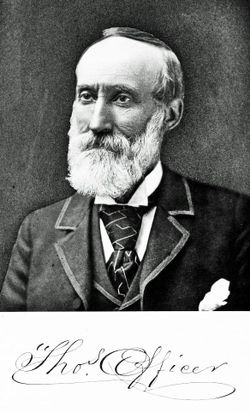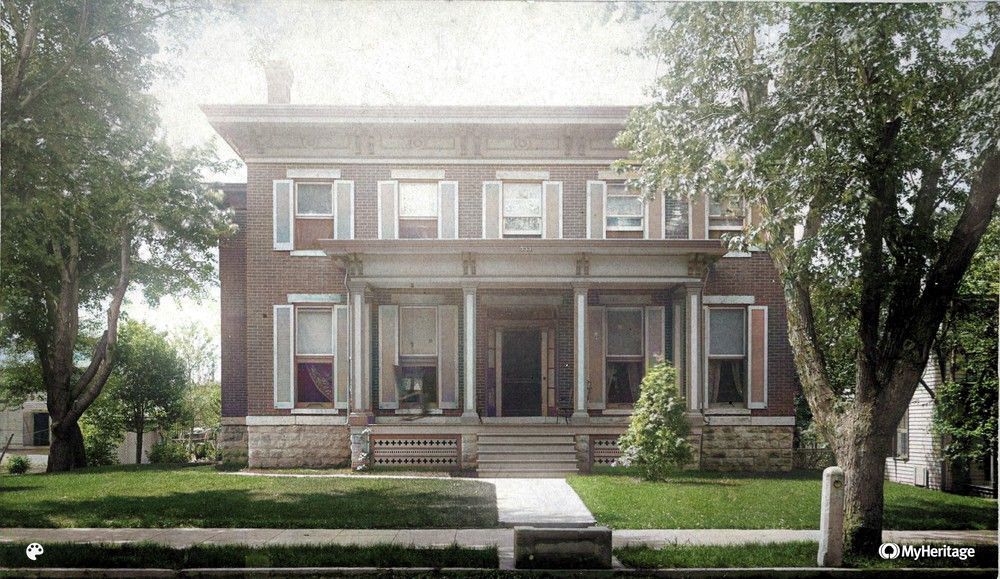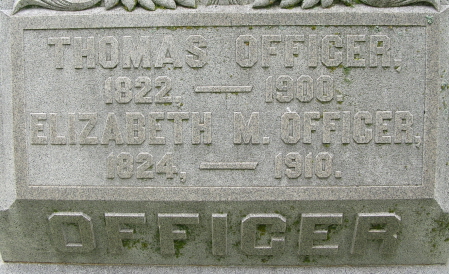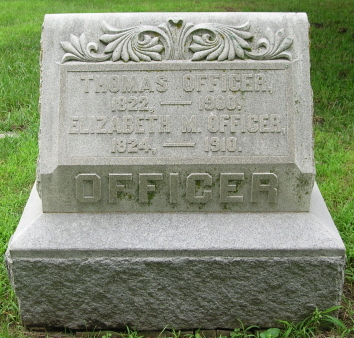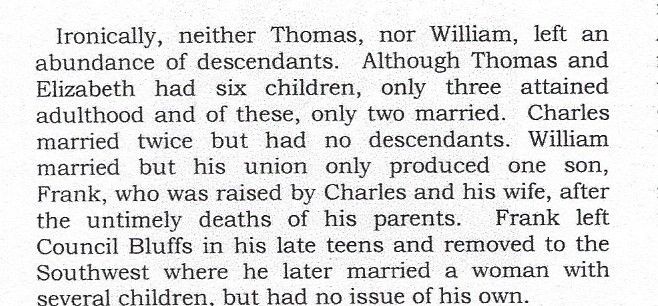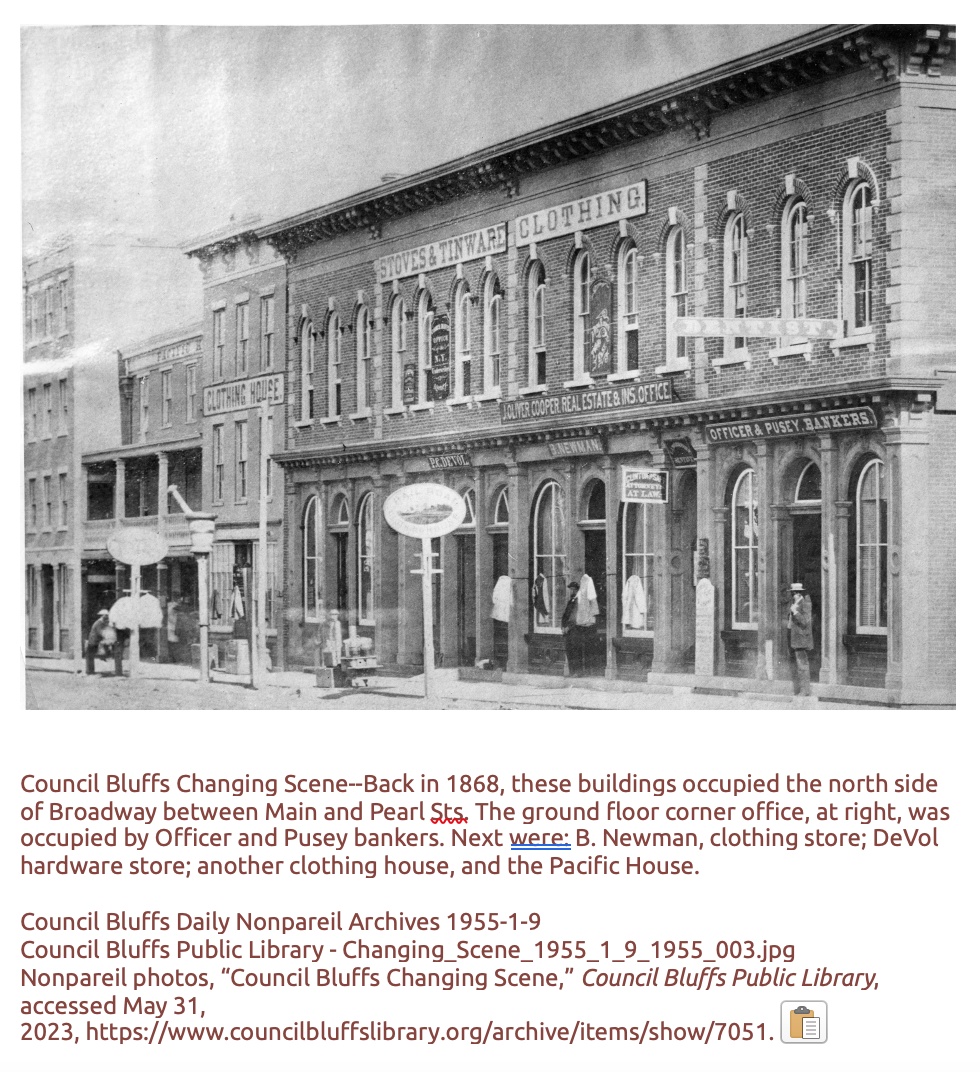DEATH OF A PIONEER
THOMAS OFFICER SUCCUMBS AT THE AGE OF 77.
IDENTIFIED WITH THE CITY FOR HALF A CENTURY.
SUCCESSFUL IN BUSINESS AND GENEROUS WITH FELLOWMEN.
Close of a Life of Remarkable Activity Along Many Lines, With Great Effort for Good.
Thomas Officer, one of the men whose lives have been woven into the growth of the city and have been made part of the history of Council Bluffs, died yesterday about noon at his home on Willow avenue, after a brief illness, which began on Monday of last week at Leadville, Col., where he had been spending the summer. During the recent months the members of the family, as they have seen him from day to day, were loathe to believe that he was failing in strength, but as they look back now they realize that for several months his vitality has been giving away. He realized that he had not long to live and as he put it "was living on borrowed time," but he was anxious to hold out to the last and die in the harness.
Left to Avoid the Heat.
Feeling oppressed by the intense heat of early July, Mr. Officer suddenly left for Colorado, where he hoped to feel better. After spending a day or two in Denver, he hurried on to Leadville only to find that he had made the change too suddenly and that he must seek a lower altitude for a time. He immediately returned to Denver, where he found business that called him to Kansas, and on his return to Denver he started again for Leadville by easy stages. This accomplished the desired result, for by the time he had again reached the higher altitude his system had become accustomed to the change and he seemed to get along well. Letters written home told of his enjoyment of the summer and of the improvement in the condition of the health of his son, William P., who was there with him and who was tramping the mountains.
Monday night of last week he was taken sick with a bowel trouble, but Tuesday he was better and went down town. That night the illness came on him again and with greater severity. During the night he caught cold and when morning came he was found to be seriously ill and suffering from a nervous chill. He was then taken to St. Luke's hospital until Saturday, when his son started home with him. They missed connections at Denver and Mr. Officer lay all day Sunday in the sleeper on a side track outside of Denver and arrived here on Monday. Mrs. Officer and her son, Charles T. Officer, started from here Saturday to meet the sick man, but owing to the failure of the connections the meeting failed and Mrs. Officer and son spent Sunday in a Kansas town where they met the returning party on Monday. After arriving here, Mr. Officer failed rapidly and it was seen that his death was only a question of a short time.
Sketch of His Life.
Thomas Officer was born near Little Washington, Washington county, Pennsylvania, December 28, 1822, and was the son of Robert and Margaret Scott Officer. He graduated from Washington-Jefferson college at the age of 17 years with the highest honors of his class, and, being set apart for the ministry, he attended Princeton theological seminary where he was a classmate and companion of many of the great theologians of the Presbyterian church--for instance Dr. William Paxton with whom, throughout their lives, he was a close friend. His eyes failed him after two years of close application to the profession of his choice and he had to seek a vocation where he could use his hands rather than his eyes. He received the appointment of instructor at the Ohio institute for the Deaf and Dumb at Columbus, where he remained several years and until selected by the legislature of Illinois to build and act as president of the Institute for the Deaf and Dumb Jacksonville. He organized that school and laid out the grounds for the building which is now one of the objects of pride in Illinois. Ten years later he came west to enter up some land at Sioux City and Council Bluffs.
Came to Council Bluffs.
That was the beginning of his acquaintance with this section of the country. In the following year he went back to Illinois for his family and Council Bluffs has since been his home and the center of his interests. He was associated in the removal west with W. H. M. Pusey and the two men established the private bank of Officer & Pusey in 1857. This bank has stood through all of the panics and financial troubles which have since swept over this country and it is said it is the only one of seventeen banks in this city that went safely through the panic of 1857. Together the men have engaged in various enterprises in this vicinity, though in the main they have held to their banking and real estate business. At times they would pick up some business on a mortgage and carry it on until they had secured the money they had invested and would then dispose of the property at a profit. In this way they have successfully managed lumber yards, saw and grist mills and other enterprises.
But Mr. Officer was not a selfish man and where he saw a movement which should be undertaken for the good of the city, he did not hesitate to embark in it. When he came here he was lost without a Presbyterian church so he immediately organized one and from that time until his death was a ruling elder in the church in this city. He has always contributed generously to the support and maintenance of the organization and to kindred interests. He organized the first school in the city, seeing that there was no place to educate the children and realizing that such must not be neglected. He was the principal owner and builder of the first electric light works in the city, later selling it out to other parties. Mr. Officer has served the public as a councilman and for years was a member and president of the school board.
Help to the Deaf and Dumb.
His fame as an expert instructor in the sign language of the deaf and dumb induced the legislature of Iowa to locate at Council Bluffs the state institute for the deaf and Dumb, largely that the state and the afflicted children would receive the advantages of his council and wide experience in the successful eleemosynary institution of Iowa. With Hon. Caleb Baldwin and Maj. Gen. Grenville M. Dodge, he selected the site for the institution and formulated the plan of organization. He was a member of the board of directors and for years its president.
Mr. Officer was married August 8, 1848, to Miss Elizabeth M. Pusey, a sister of W. H. M. Pusey, and all through these more than fifty-two years she has been his helpmeet and closest friend. Two sons and a daughter survive with Mrs. Officer. Charles T. Officer is teller of the Officer & Pusey bank; Miss Julia E. Officer resides at home and William P. Officer recently disposed of his business in this city because of ill health. Other relatives in this city are two sisters and a brother---Mrs. W. H. M. Pusey, Mrs. Rebecca Blaine and Robert P. Officer.
Mr. Pusey's Estimate of Him.
W. H. M. Pusey who has been associated with Mr. Officer for half a century was asked for an estimate of his character and he replied as follows:
"Yes, I knew Thomas Officer from young manhood until his death. He was of Scotch-Irish lineage, a blue stocking of no uncertain color. When he came to Council Bluffs we did not have a school house nor a school law (which is now the pride of Iowa) and further, no Presbyterian church, the church of his fathers. What did he do? He imported a preacher and teacher from Kentucky and largely supported him and his family and organized a Presbyterian church of twelve members, thus setting the Presbyterian faith and doctrine on wheels until, in its evolution and revolutions, the church of his childhood and heart wields a potent influence in the loved city he had chosen as the place of his life work. He took his imported Kentucky school teacher and set him up in business by procuring for hi a large school by private subscriptions and made a Presbyterian elder of the school teacher. Never seeking preferment, yet his aptness made him prominent in our schools, municipal government and the Deaf and Dumb institute, which received all the benefits of his enlarged experience. No public enterprise which received his approval, ever failed also to receive his financial aid. Dwelling in darkness, he gave us the electric light system.
"As a pure upright christian man all of we poineers(sic) will concede to him the advanced station in christian manhood, crowning his lovely life and character with the highest and most deserved praise.
"As a banker he was loyal to his clientage and they were loyal to him, so through his long years of banker, he has maintained, his well earned reputation of success and popularity. The good man, full of honors and years, has gone and if the people read his history and acheivements(sic), they would simply reiterate the epitaph on the tomb of Christopher Wren,
"'If you would read my history, look around you.'"
As Seen By His Pastor.
Rev. W. B. Barnes, pastor of the First Presbyterian church, said that the place left vacant in the church by the death of Mr. Officer can never be filled, for in every item of the church work, the spiritual as well as the financial, he had a part. He was the most conspicuous man in the church and took his share in every feature either small or great and was a liberal supporter of all of its financial interests. Rev. Mr. Barnes referred to Mr. Officer's part in the organization of the church and to the fact that he had been elder for forty-four years.
Others in speaking of Mr. Officer have referred to his exactness, saying that he was very methodical and believed that if you want a thing done right, the surest way to secure it is to do it yourself. He was a sturdy, upright man, of strictest integrity and one given to the advancement of all good things that he saw about him in the world. No charitable work in the city ever suffered from lack of his support and no appeal made to him in behalf of any beneficent or religious movement was in vain. To all organized work of this character in the city he contributed a specific amount regularly. But about all of this work he was most unostentatious and whether sending out provisions for a needy family or contributing money to a worthy cause, he always sought to conceal the identity of the giver.
The funeral will be held on Friday afternoon at 2:30 at the residence and all friends are invited to attend. The service, in harmony with the desire that he recently expressed, will be very simply, with no eulogy. The burial will occur later and will be private. The family requests that no flowers be sent.
+++
Biographical History of Pottawattamie County, IOWA, Containing Portraits of all the Presidents of the United States with accompanying Biographies of each; a Condensed History of Iowa, with Portraits and Biographies of the Governors of the State; and Engravings of Prominent Citizens of Pottawattamie County, with Personal Histories of many of the Early Settlers and Leading Families, The Lewis Publishing Company, 1891. Pages 495-496
THOMAS OFFICER, of the banking house of Officer & Pusey, Council Bluffs, the oldest and one of the most solid banking firms in Iowa, was born in Washington, Washington County, Pennsylvania, December 28, 1822. He is descended from those hardy Scotch-Irish Presbyterians so prominent in the history of Pennsylvania and the United States. His grandfather, Thomas Officer, was born in Chester County, Pennsylvania; was a man of more than ordinary ability and intelligence, and held various offices of trust in his county. His great-grandfather, with a brother, came from the north of Ireland to Pennsylvania soon after the Revolution, one settling near Knoxville, Tennessee, and the other in Chester County, Pennsylvania, from whom have descended about all now in America who inherit the family name. Our subject's father, Robert Officer, was born in Chester County, and when two years of age moved with his parents to Washington County, Pennsylvania. In early life he engaged in merchandising at Washington and Williamsport, Pennsylvania, and died in 1874, at the age of seventy-nine years. He was united in marriage to Miss Margaret Scott, the daughter of John and Jane (Patterson) Scott. Mr. and Mrs. Robert Officer were Presbyterians, and were the parents of eleven children, four of whom are living, viz.: Thomas, our subject; Rebecca, wife of Neal G. Blaine, a brother of the Hon. James G. Blaine (she is now a widow, and resides in Council Bluffs); S. Ellen, wife of the Hon. Wm. H. M. Pusey, a banker of this city; Robert, also of this city, engaged in the real-estate and insurance business.
Thomas Officer, our subject, graduated at Washington (Pennsylvania) College in 1840, and went at once to Columbus, Ohio, where he was employed as an instructor in the Ohio State Institution for the Deaf and Dumb for five years. He was then called to Jacksonville, Illinois, where he organized, laid out the grounds, and built the Illinois State Institution for the Deaf and Dumb, and remained as principal and superintendent for ten years. He then resigned this position and came to Council Bluffs, Iowa. In 1856 he formed his present partnership with Mr. Pusey, purchasing the same ground on which their present bank building now stands, and in the spring of 1857 opened their present bank, then as now a private bank. This is one of the solid firms in the county, and is worthy of record, as it is one of the few that passed through the panics of 1857-'71-'73. Out of seventeen banking institutions in Council Bluffs, this is the only one that survived the panic of 1857.
Mr. Officer was united in marriage August 8, 1848, to Miss Elizabeth M. Pusey, who was born in Washington County, Pennsylvania, and is the sister of Hon. William H. M. Pusey, whose sketch appears in this work. Mr. and Mrs. Officer rank among the very best people of Council Bluffs and also of Iowa, and are universally admired and respected for their sterling worth. They are members of the First Presbyterian Church, of which he has been a ruling elder ever since its organization in 1856. They are the parents of three children: Charles T., teller in the bank with his father and uncle, and married to Miss Boyle of Pittsburg, Pennsylvania; Julia E., a talented musician and a graduate of the Petercilia School of Music of Boston, Massachusetts, and also of the Rockford (Illinois) Female Seminary; and William P., an assistant with his father and uncle in the bank. Mr. Officer has never sought office, but yet has held various local offices of trust, such as Councilman and a member and president of the School Board. His known personal experience and prominence in connection with institutions for the deaf and dumb in other States was an important factor in securing the location of the Iowa State Institution at Council Bluffs. In conjunction with Hon. Caleb Baldwin and Major-General Grenville M. Dodge, he was appointed as commissioner in behalf of the State to select the site, purchase the grounds, decide upon the plans and erect the buildings, all of which was done under their management. He afterward served, under appointment by the state, as a member of the Board of Directors for a number of years, and part of the time as president of the board. He enjoys the confidence and respect of all, and is a gentleman of the strictest integrity.
DEATH OF A PIONEER
THOMAS OFFICER SUCCUMBS AT THE AGE OF 77.
IDENTIFIED WITH THE CITY FOR HALF A CENTURY.
SUCCESSFUL IN BUSINESS AND GENEROUS WITH FELLOWMEN.
Close of a Life of Remarkable Activity Along Many Lines, With Great Effort for Good.
Thomas Officer, one of the men whose lives have been woven into the growth of the city and have been made part of the history of Council Bluffs, died yesterday about noon at his home on Willow avenue, after a brief illness, which began on Monday of last week at Leadville, Col., where he had been spending the summer. During the recent months the members of the family, as they have seen him from day to day, were loathe to believe that he was failing in strength, but as they look back now they realize that for several months his vitality has been giving away. He realized that he had not long to live and as he put it "was living on borrowed time," but he was anxious to hold out to the last and die in the harness.
Left to Avoid the Heat.
Feeling oppressed by the intense heat of early July, Mr. Officer suddenly left for Colorado, where he hoped to feel better. After spending a day or two in Denver, he hurried on to Leadville only to find that he had made the change too suddenly and that he must seek a lower altitude for a time. He immediately returned to Denver, where he found business that called him to Kansas, and on his return to Denver he started again for Leadville by easy stages. This accomplished the desired result, for by the time he had again reached the higher altitude his system had become accustomed to the change and he seemed to get along well. Letters written home told of his enjoyment of the summer and of the improvement in the condition of the health of his son, William P., who was there with him and who was tramping the mountains.
Monday night of last week he was taken sick with a bowel trouble, but Tuesday he was better and went down town. That night the illness came on him again and with greater severity. During the night he caught cold and when morning came he was found to be seriously ill and suffering from a nervous chill. He was then taken to St. Luke's hospital until Saturday, when his son started home with him. They missed connections at Denver and Mr. Officer lay all day Sunday in the sleeper on a side track outside of Denver and arrived here on Monday. Mrs. Officer and her son, Charles T. Officer, started from here Saturday to meet the sick man, but owing to the failure of the connections the meeting failed and Mrs. Officer and son spent Sunday in a Kansas town where they met the returning party on Monday. After arriving here, Mr. Officer failed rapidly and it was seen that his death was only a question of a short time.
Sketch of His Life.
Thomas Officer was born near Little Washington, Washington county, Pennsylvania, December 28, 1822, and was the son of Robert and Margaret Scott Officer. He graduated from Washington-Jefferson college at the age of 17 years with the highest honors of his class, and, being set apart for the ministry, he attended Princeton theological seminary where he was a classmate and companion of many of the great theologians of the Presbyterian church--for instance Dr. William Paxton with whom, throughout their lives, he was a close friend. His eyes failed him after two years of close application to the profession of his choice and he had to seek a vocation where he could use his hands rather than his eyes. He received the appointment of instructor at the Ohio institute for the Deaf and Dumb at Columbus, where he remained several years and until selected by the legislature of Illinois to build and act as president of the Institute for the Deaf and Dumb Jacksonville. He organized that school and laid out the grounds for the building which is now one of the objects of pride in Illinois. Ten years later he came west to enter up some land at Sioux City and Council Bluffs.
Came to Council Bluffs.
That was the beginning of his acquaintance with this section of the country. In the following year he went back to Illinois for his family and Council Bluffs has since been his home and the center of his interests. He was associated in the removal west with W. H. M. Pusey and the two men established the private bank of Officer & Pusey in 1857. This bank has stood through all of the panics and financial troubles which have since swept over this country and it is said it is the only one of seventeen banks in this city that went safely through the panic of 1857. Together the men have engaged in various enterprises in this vicinity, though in the main they have held to their banking and real estate business. At times they would pick up some business on a mortgage and carry it on until they had secured the money they had invested and would then dispose of the property at a profit. In this way they have successfully managed lumber yards, saw and grist mills and other enterprises.
But Mr. Officer was not a selfish man and where he saw a movement which should be undertaken for the good of the city, he did not hesitate to embark in it. When he came here he was lost without a Presbyterian church so he immediately organized one and from that time until his death was a ruling elder in the church in this city. He has always contributed generously to the support and maintenance of the organization and to kindred interests. He organized the first school in the city, seeing that there was no place to educate the children and realizing that such must not be neglected. He was the principal owner and builder of the first electric light works in the city, later selling it out to other parties. Mr. Officer has served the public as a councilman and for years was a member and president of the school board.
Help to the Deaf and Dumb.
His fame as an expert instructor in the sign language of the deaf and dumb induced the legislature of Iowa to locate at Council Bluffs the state institute for the deaf and Dumb, largely that the state and the afflicted children would receive the advantages of his council and wide experience in the successful eleemosynary institution of Iowa. With Hon. Caleb Baldwin and Maj. Gen. Grenville M. Dodge, he selected the site for the institution and formulated the plan of organization. He was a member of the board of directors and for years its president.
Mr. Officer was married August 8, 1848, to Miss Elizabeth M. Pusey, a sister of W. H. M. Pusey, and all through these more than fifty-two years she has been his helpmeet and closest friend. Two sons and a daughter survive with Mrs. Officer. Charles T. Officer is teller of the Officer & Pusey bank; Miss Julia E. Officer resides at home and William P. Officer recently disposed of his business in this city because of ill health. Other relatives in this city are two sisters and a brother---Mrs. W. H. M. Pusey, Mrs. Rebecca Blaine and Robert P. Officer.
Mr. Pusey's Estimate of Him.
W. H. M. Pusey who has been associated with Mr. Officer for half a century was asked for an estimate of his character and he replied as follows:
"Yes, I knew Thomas Officer from young manhood until his death. He was of Scotch-Irish lineage, a blue stocking of no uncertain color. When he came to Council Bluffs we did not have a school house nor a school law (which is now the pride of Iowa) and further, no Presbyterian church, the church of his fathers. What did he do? He imported a preacher and teacher from Kentucky and largely supported him and his family and organized a Presbyterian church of twelve members, thus setting the Presbyterian faith and doctrine on wheels until, in its evolution and revolutions, the church of his childhood and heart wields a potent influence in the loved city he had chosen as the place of his life work. He took his imported Kentucky school teacher and set him up in business by procuring for hi a large school by private subscriptions and made a Presbyterian elder of the school teacher. Never seeking preferment, yet his aptness made him prominent in our schools, municipal government and the Deaf and Dumb institute, which received all the benefits of his enlarged experience. No public enterprise which received his approval, ever failed also to receive his financial aid. Dwelling in darkness, he gave us the electric light system.
"As a pure upright christian man all of we poineers(sic) will concede to him the advanced station in christian manhood, crowning his lovely life and character with the highest and most deserved praise.
"As a banker he was loyal to his clientage and they were loyal to him, so through his long years of banker, he has maintained, his well earned reputation of success and popularity. The good man, full of honors and years, has gone and if the people read his history and acheivements(sic), they would simply reiterate the epitaph on the tomb of Christopher Wren,
"'If you would read my history, look around you.'"
As Seen By His Pastor.
Rev. W. B. Barnes, pastor of the First Presbyterian church, said that the place left vacant in the church by the death of Mr. Officer can never be filled, for in every item of the church work, the spiritual as well as the financial, he had a part. He was the most conspicuous man in the church and took his share in every feature either small or great and was a liberal supporter of all of its financial interests. Rev. Mr. Barnes referred to Mr. Officer's part in the organization of the church and to the fact that he had been elder for forty-four years.
Others in speaking of Mr. Officer have referred to his exactness, saying that he was very methodical and believed that if you want a thing done right, the surest way to secure it is to do it yourself. He was a sturdy, upright man, of strictest integrity and one given to the advancement of all good things that he saw about him in the world. No charitable work in the city ever suffered from lack of his support and no appeal made to him in behalf of any beneficent or religious movement was in vain. To all organized work of this character in the city he contributed a specific amount regularly. But about all of this work he was most unostentatious and whether sending out provisions for a needy family or contributing money to a worthy cause, he always sought to conceal the identity of the giver.
The funeral will be held on Friday afternoon at 2:30 at the residence and all friends are invited to attend. The service, in harmony with the desire that he recently expressed, will be very simply, with no eulogy. The burial will occur later and will be private. The family requests that no flowers be sent.
+++
Biographical History of Pottawattamie County, IOWA, Containing Portraits of all the Presidents of the United States with accompanying Biographies of each; a Condensed History of Iowa, with Portraits and Biographies of the Governors of the State; and Engravings of Prominent Citizens of Pottawattamie County, with Personal Histories of many of the Early Settlers and Leading Families, The Lewis Publishing Company, 1891. Pages 495-496
THOMAS OFFICER, of the banking house of Officer & Pusey, Council Bluffs, the oldest and one of the most solid banking firms in Iowa, was born in Washington, Washington County, Pennsylvania, December 28, 1822. He is descended from those hardy Scotch-Irish Presbyterians so prominent in the history of Pennsylvania and the United States. His grandfather, Thomas Officer, was born in Chester County, Pennsylvania; was a man of more than ordinary ability and intelligence, and held various offices of trust in his county. His great-grandfather, with a brother, came from the north of Ireland to Pennsylvania soon after the Revolution, one settling near Knoxville, Tennessee, and the other in Chester County, Pennsylvania, from whom have descended about all now in America who inherit the family name. Our subject's father, Robert Officer, was born in Chester County, and when two years of age moved with his parents to Washington County, Pennsylvania. In early life he engaged in merchandising at Washington and Williamsport, Pennsylvania, and died in 1874, at the age of seventy-nine years. He was united in marriage to Miss Margaret Scott, the daughter of John and Jane (Patterson) Scott. Mr. and Mrs. Robert Officer were Presbyterians, and were the parents of eleven children, four of whom are living, viz.: Thomas, our subject; Rebecca, wife of Neal G. Blaine, a brother of the Hon. James G. Blaine (she is now a widow, and resides in Council Bluffs); S. Ellen, wife of the Hon. Wm. H. M. Pusey, a banker of this city; Robert, also of this city, engaged in the real-estate and insurance business.
Thomas Officer, our subject, graduated at Washington (Pennsylvania) College in 1840, and went at once to Columbus, Ohio, where he was employed as an instructor in the Ohio State Institution for the Deaf and Dumb for five years. He was then called to Jacksonville, Illinois, where he organized, laid out the grounds, and built the Illinois State Institution for the Deaf and Dumb, and remained as principal and superintendent for ten years. He then resigned this position and came to Council Bluffs, Iowa. In 1856 he formed his present partnership with Mr. Pusey, purchasing the same ground on which their present bank building now stands, and in the spring of 1857 opened their present bank, then as now a private bank. This is one of the solid firms in the county, and is worthy of record, as it is one of the few that passed through the panics of 1857-'71-'73. Out of seventeen banking institutions in Council Bluffs, this is the only one that survived the panic of 1857.
Mr. Officer was united in marriage August 8, 1848, to Miss Elizabeth M. Pusey, who was born in Washington County, Pennsylvania, and is the sister of Hon. William H. M. Pusey, whose sketch appears in this work. Mr. and Mrs. Officer rank among the very best people of Council Bluffs and also of Iowa, and are universally admired and respected for their sterling worth. They are members of the First Presbyterian Church, of which he has been a ruling elder ever since its organization in 1856. They are the parents of three children: Charles T., teller in the bank with his father and uncle, and married to Miss Boyle of Pittsburg, Pennsylvania; Julia E., a talented musician and a graduate of the Petercilia School of Music of Boston, Massachusetts, and also of the Rockford (Illinois) Female Seminary; and William P., an assistant with his father and uncle in the bank. Mr. Officer has never sought office, but yet has held various local offices of trust, such as Councilman and a member and president of the School Board. His known personal experience and prominence in connection with institutions for the deaf and dumb in other States was an important factor in securing the location of the Iowa State Institution at Council Bluffs. In conjunction with Hon. Caleb Baldwin and Major-General Grenville M. Dodge, he was appointed as commissioner in behalf of the State to select the site, purchase the grounds, decide upon the plans and erect the buildings, all of which was done under their management. He afterward served, under appointment by the state, as a member of the Board of Directors for a number of years, and part of the time as president of the board. He enjoys the confidence and respect of all, and is a gentleman of the strictest integrity.
Family Members
Sponsored by Ancestry
Advertisement
Advertisement
